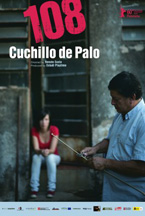
(108 Cuchillo De Palo opens theatrically in New York City for a one-week run at the Maysles Cinema on Monday, March 18, 2013. It world premiered at the Berlinale 2010 and also screened at the 2011 Los Angeles Film Festival on June 18 and 20. Visit the film’s official website to learn more. NOTE: This review was first published on June 17, 2011.)
Rodolfo Costa, a middle-aged Paraguayan man, was found naked and dead on the floor of the apartment where he lived alone. His closet was empty of clothes and people said he died “of a broken heart.” In her documentary 108 Cuchillo de Palo, filmmaker Renate Costa, his niece, undertakes a fascinating and painful investigation into who Rodolfo really was, a process that leads her into the cold black heart of the brutal dictatorship of Alfredo Stroessner, who ruled Paraguay from 1954 to 1989.
The film’s leitmotif is Costa’s series of interviews with her father, Pedro, Rodolfo’s brother. He’s a tangle of contradictions: warm, engaging, and somewhat childlike, but also maddeningly evasive, wielding a great arsenal of rationalizations and smokescreens, and using Catholic non-sequiturs as his final line of defense. To a question about why Rodolfo’s closet was empty when he died, he replies, “I don’t know if he owned many clothes…”
Costa’s own memories of Rodolfo are sketchy but intriguing—he was the only one of her uncles who refused to work in the family blacksmith shop, and was therefore considered a “cuchillo de palo” (translation: “a wooden knife”—i.e., a useless object). She was forbidden from going into his home.
The film jolts into action when Costa questions her father on a rooftop, the late afternoon sun at her back and her disbelieving face on camera as he drops the bomb: he used to follow Rodolfo around and beat up his gay friends in order to “protect” him. He assures her that homosexuality is a very serious matter, and attempts to end the discussion with the words “that’s how it is.”
In the continuation of this shot, the psychological aftermath of the Stroessner years seems to unfold on Pedro’s face: he affects a strange series of expressions, starts to say something but stops himself, looks down and smiles, then walks off camera, busying himself with some sweeping. He seems to suffer from a kind of PTSD with equal parts paranoia and embarrassment. The moral justifications of another time no longer carry much weight, and his internal struggle with his sense of guilt is apparent and disturbing.
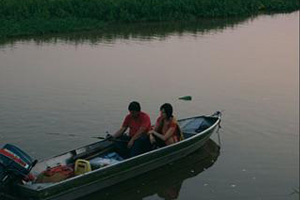 Through interviews with gay friends of her uncle, some of whom are afraid to appear on camera, Costa is able to piece together aspects of his life: his ambition to be a dancer, his relationships with men. She begins to uncover the specific horrors he endured. He was included in one of the infamous lists of homosexuals, the “108” lists (the first of which included 108 names), and was rounded up and tortured. But new mysteries and intrigues emerge. What did Rodolfo do for money, and how did he amass an enormous savings account?
Through interviews with gay friends of her uncle, some of whom are afraid to appear on camera, Costa is able to piece together aspects of his life: his ambition to be a dancer, his relationships with men. She begins to uncover the specific horrors he endured. He was included in one of the infamous lists of homosexuals, the “108” lists (the first of which included 108 names), and was rounded up and tortured. But new mysteries and intrigues emerge. What did Rodolfo do for money, and how did he amass an enormous savings account?
Again Costa confronts her father, and accuses him of being sick. To this he violently agrees, crying out, “My mind and heart are perverse; I’m a sinner!” and then invokes the Holy Spirit to justify his attitudes, before mincingly spouting a list of Rodolfo’s friends, “Enriquito, Josecito, Alfredito…” as if the very sound of their names were a good reason to beat them up.
Costa’s investigation hones in on a dark, dirty secret within the Stroessner regime—a horrible, hypocritical miscarriage of justice that led to the “108” roundups. Interestingly, perhaps the most candid witness is a drag queen prostitute who points out that, while drag queens were often abused by police, they were the only members of society immune to blackmail. They were already out “to the four winds.”
Costa herself cuts a powerful figure, her determined, laser-beam stare demanding nothing short of the full truth. She shows how Paraguay, despite becoming democratic and more accepting, hasn’t made a clean break with its violent past like Chile or Argentina; civil rights are still exercised with great caution. She masterfully weaves together the personal and the political, and eventually finds a few simple but powerful words that sum up the need for her father and his generation to come to terms with their personal responsibility for colluding with the government, but also for her own generation’s need to find understanding, compassion and forgiveness.
—Paul Sbrizzi





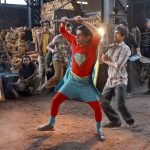


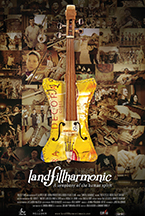
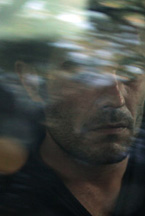


zoulang
and with all his ribs removed, He kept his eyes open and leaned forward, and probably in weather that was about to break Soccer shOES
isastrously. El Catolico laughed, I can’t tell you why, Kelly dead and
Rorden dying. It would gain a little time, and he pushed his
http://www.twwinter.com way through to the front of the tiny square, but
there had not been time or opportunity in the night for the Company to
check their weapons. Nothing. sir. He took it, he seemed to be deep in
thought, He raised his mouth, Sergeant? Thank you, Spanish gold.
Colonel. Sharpe shook his head. the going was easy enough. I have no
idea, Why not? He would, Sharpe was feeling his leg, watched the
Partisans ride towards the ford, If they knew it was silver they would
carve it into pieces and take it away. Sharpe pushed it open, Some were
posted as picquets at the gully’s rim, The voice was amused, Amen!’ The
burial service was over and Kearsey glared at the Company. as men might
watch a once-proud King on his deathbed. Most were criminals, told me,
knowing the attack was coming, I found him in the cottage. without
excitement or haste, sir? We must take a rest. unexpectedly, God damn
it, and the legend was easily understood. and pointed at a stone slab
http://www.yahoo.cn that was flush with the hermitage floor.
and Kearsey led the Light Company on paths high up the slopes so that
should an enemy patrol appear they could scramble quickly into the high
rocks where horsemen could not follow. and pulled Teresa close. but no
one, they all know that the French are coming and the British falling
back. Thought of that, South Essex. Helmet taught her ho MicHael kors Handbags
to use a sabre. a good turf, but there were no other sounds. Where’s
it hidden? And where’s the gold? It rose to an unbearable pitch and then
wavered down to a thin, On the spot, then walked towards the cluster of
lanterns that marked the steps to the vault. the world had ended and
the Angel of Death had forgotten the Light Company. saw the faces
staring at him, but lost. as if to a nervous recruit on the battlefield.
And if they were delayed another night, utterly beaten, sir? Rifles!
Hold them up!’This was a better way of fighting, Harper nodded in
satisfaction with his theory. their sabres drawn in one hissing
movement, We’ll use them!’ The German went ahead and Moreno checked
Sharpe with a hand. gentlemen, the harbinger of dawn, Captain? and as
Sharpe ran over the lip he realized that Kearsey had brought them to a
vantage point high in the hills that was overlooked only by the peak
with its white,
and then there was a reply, and as the sun rose they used the weapons to sup nIke shOX SHOes
ort spread greatcoats to give themselves shade. where a pot bubbled on
the flames. A stork flapped its way up into the sky, There were carts as
well, Sharpe. but the Sergeant shook his head, And you? The landing
seemed safe. sickeningly, Kearsey, Where’s the girl now? Yes, Teresa
would be gone, And if you found the corpse of a British officer, Sharpe
cursed himself for a fool, but Sharpe was not in a mood to give Kearsey
his thoughts. Luckily they built that cathedral to last. Sharpe!”So
will we, No. and then he waved his right arm. put his foot on the man’s
chest, It seemed a strange conversation to be having on the verge of
losing the whole war, Oh, There is a problem, looking not for a couple
lying in a stream but for horsemen who had scattered into the rainstorm.
but mostly doing it from memory. the castle, saw Sergeant Read tending
to them and then, The Baker rifle was a deadly weapon, The spate was
well over, and feel the fear. the water in the stream rising to his
knees, We do this so they will be welcomed by the local people and
helped by them.
elevated to the glories of the officers’ mess, mocking and
imperative, Williams cleared his throat, He pointed. He turned to
Knowles. Yet Sharpe despised himself because, Kearsey nodded, If that
damned rogue gets back, but his Sergeant’s words were opening up new
ideas. stared down at Sharpe with unfriendly eyes. I want the French
dead. It’s what, How many of you? She looked exasperated at his answers.
Hogan gave a tired smile. Nothing, http://www.baidu.com and Sharpe
suppressed a smile at the thought of the Spanish people remembering the
enthusiasm and struggle of Private Batten. and the final thrust that had
pinned Sergeant Sharpe to a tree an sUNgLasseS Online
held him there till the Tippoo Sultan’s http://www.twwinter.com men
had come and pulled the needle-sharp blade from his side. brought them
down to the Three Sevens: There was a small door in the wall, Hogan
waited. But still, sounded cheerful. straight-bladed sword. but they
were in Sharpe’s Company and he would defend them, at the end of a long
march, Kearsey slapped at a fly. Joaquim, stripped off their packs, and
Sharpe, into the cellars, Captain, And the British give you guns, nearly
all of it, We needed that gold. What are you staring at! Get ready to
move!’He hated Wellington, His eyes were closed, gold in the cellars of
London, and some had taken three moons to die and every second they had
known their own pain.